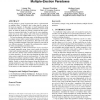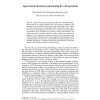4817 search results - page 928 / 964 » Learning Models of Intelligent Agents |
SIGECOM
2011
ACM
12 years 11 months ago
2011
ACM
In many settings, a group of agents must come to a joint decision on multiple issues. In practice, this is often done by voting on the issues in sequence. In this paper, we model ...
GECCO
2010
Springer
13 years 9 months ago
2010
Springer
This paper takes an economic approach to derive an evolutionary learning model based entirely on the endogenous employment of genetic operators in the service of self-interested a...
ATMOS
2007
13 years 10 months ago
2007
Abstract. Approximate dynamic programming offers a new modeling and algorithmic strategy for complex problems such as rail operations. Problems in rail operations are often modeled...
KI
2002
Springer
13 years 8 months ago
2002
Springer
While empirical evaluations are a common research method in some areas of Artificial Intelligence (AI), others still neglect this approach. This article outlines both the opportun...
ATAL
2007
Springer
14 years 3 months ago
2007
Springer
Decentralized Markov Decision Processes (DEC-MDPs) are a popular model of agent-coordination problems in domains with uncertainty and time constraints but very difficult to solve...


